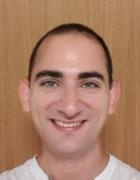Asst. Prof. Uzi Pereg joined the Technion’s Viterbi Faculty of Electrical and Computer Engineering and the Helen Diller Quantum Center this Fall (2022), after returning from 2.5 years of postdoctoral research at the Technical University of Munich. Since his main field of expertise is Quantum Communications Theory, he is also closely involved with the Helen Diller Quantum Center.
It was actually only during his postdoc research that Pereg switched his focus from more classic communications to quantum communications. “Quantum is a new and fascinating field with many open questions,” he explains his interest in the field.
After completing a B.Sc. in Electronics Engineering at the Azrieli College of Engineering in his hometown of Jerusalem, Pereg spent the following seven years at the Technion, pursuing master’s and PhD degrees at the Viterbi Faculty of Electrical Engineering. His doctoral thesis, titled “Single and Multi User Arbitrarily Varying Channels,” was supervised by Prof. Yossef Steinberg.
Pereg explains that one of the main challenges in communication theory is that the speed of transmitting information is limited. Researchers are tackling this challenge by trying to make broadcasts more reliable and efficient.
“My field is studying channel capacity, specifically Quantum Shannon theory – which makes it possible to broadcast faster than with the classical communication theory that Claude Shannon developed 75 years ago,” Pereg elaborates. Shannon’s Mathematical Theory of Communication purports that for any given degree of noise contamination of a communication channel, it is possible to communicate discrete digital data nearly error-free up to a computable maximum rate, as long as there is even minimal correlation between the channel input and output. Quantum Shannon theory describes communication in terms of quantum systems, representing the degrees of freedom used to carry information.
Pereg’s postdoctoral research on the “Capacity of Quantum Communication Networks, Quantum Repeater Links” investigated the tradeoff between communication, entanglement, and privacy leakage rates, and sought to establish the superiority of quantum communication networks over classical systems in different settings.
“The world is currently experiencing a growing gap between technological information storage needs and communication capacities. This trend is motivating the search for new communication technologies with higher capacities. Quantum communication is a promising technology that is likely to contribute toward extremely high data rates and security. Communication networks are expected to use quantum resources in order to achieve gains in terms of latency, security, and computation power,” he points out.
The overall aim of his research is to characterize the optimal performance limits of communication networks that are based on state-of-the-art quantum technology. “This is imperative for the current design of the quantum Internet, quantum-based security applications, and quantum communication networks,” he stresses. “Major challenges in these applications include generating reliable quantum resources, overcoming the noise and the resulting distortion of data, and guaranteeing security against eavesdropping and malicious attacks. I analyze communication through noisy quantum networks and determine the performance gains achieved by adding entanglement resources between transmitters and receivers.”
Indeed, future generations of communication, such as 6G or 7G, will most likely rely on quantum theory to transmit huge amounts of data. Prof. Pereg expects that quantum communication will provide much higher levels of both privacy and speed than what is available today. Already now, certain large companies use basic quantum key distribution to ensure secure communication, but this technology is currently very expensive and has serious limitations.
Prof. Pereg has recently introduced a new model of unreliable entanglement assistance where the communication system operates whether entanglement assistance is present or not. He also researches multiparty communications, focusing on models of receivers that share entanglement.
This academic year, Pereg is teaching a course at the Technion on Quantum Communication Theory. Currently, he has one master's student working with him on research and plans to recruit more. In addition to continuing to join forces with his former colleagues from the Technical University of Munich, he also collaborates with Prof. Moti Segev of the Technion’s Department of Physics and Prof. Matthieu Bloch from Georgia Tech.
Pereg has a warm relationship with the Helen Diller Quantum Center. “I’m in constant contact with the Center. I’m organizing a winter school seminar on Quantum Computing and Communication and am supervising undergraduate students with Prof. Yossi Avron.” He is also involved with developing new courses for Technion students in the field of quantum technology. “Interest in quantum subjects is growing and the curriculum must include more courses.”

